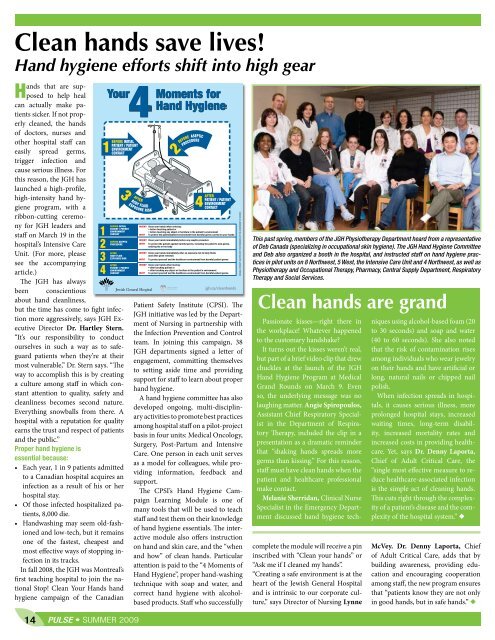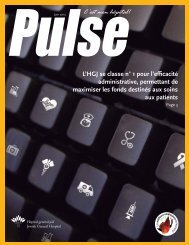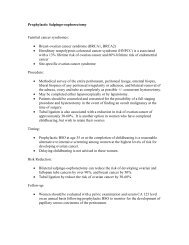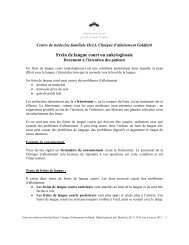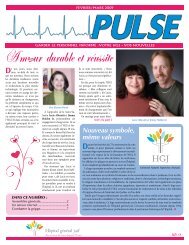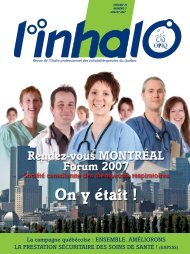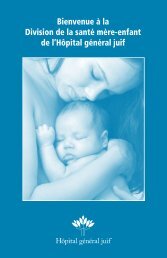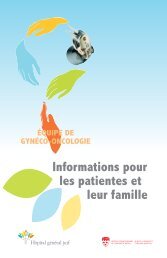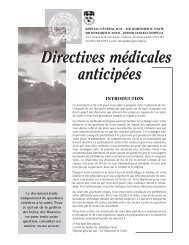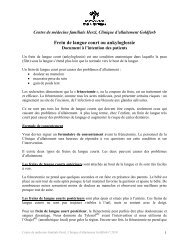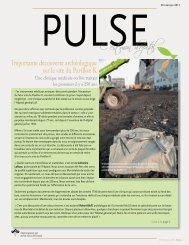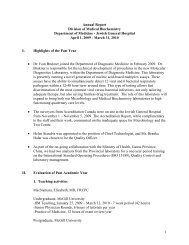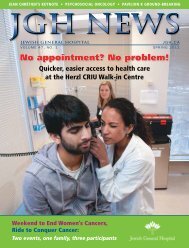The Jewish General Hospital: A picture of health
The Jewish General Hospital: A picture of health
The Jewish General Hospital: A picture of health
You also want an ePaper? Increase the reach of your titles
YUMPU automatically turns print PDFs into web optimized ePapers that Google loves.
Clean hands save lives!<br />
Hand hygiene efforts shift into high gear<br />
Hands that are supposed<br />
to help heal<br />
can actually make patients<br />
sicker. If not properly<br />
cleaned, the hands<br />
<strong>of</strong> doctors, nurses and<br />
other hospital staff can<br />
easily spread germs,<br />
trigger infection and<br />
cause serious illness. For<br />
this reason, the JGH has<br />
launched a high-pr<strong>of</strong>ile,<br />
high-intensity hand hygiene<br />
program, with a<br />
ribbon-cutting ceremony<br />
for JGH leaders and<br />
staff on March 19 in the<br />
hospital’s Intensive Care<br />
Unit. (For more, please<br />
see the accompanying<br />
article.)<br />
<strong>The</strong> JGH has always<br />
been conscientious<br />
about hand cleanliness,<br />
but the time has come to fight infection<br />
more aggressively, says JGH Executive<br />
Director Dr. Hartley Stern.<br />
“It’s our responsibility to conduct<br />
ourselves in such a way as to safeguard<br />
patients when they’re at their<br />
most vulnerable,” Dr. Stern says. “<strong>The</strong><br />
way to accomplish this is by creating<br />
a culture among staff in which constant<br />
attention to quality, safety and<br />
cleanliness becomes second nature.<br />
Everything snowballs from there. A<br />
hospital with a reputation for quality<br />
earns the trust and respect <strong>of</strong> patients<br />
and the public.”<br />
Proper hand hygiene is<br />
essential because:<br />
• Each year, 1 in 9 patients admitted<br />
to a Canadian hospital acquires an<br />
infection as a result <strong>of</strong> his or her<br />
hospital stay.<br />
• Of those infected hospitalized patients,<br />
8,000 die.<br />
• Handwashing may seem old-fashioned<br />
and low-tech, but it remains<br />
one <strong>of</strong> the fastest, cheapest and<br />
most effective ways <strong>of</strong> stopping infection<br />
in its tracks.<br />
In fall 2008, the JGH was Montreal’s<br />
first teaching hospital to join the national<br />
Stop! Clean Your Hands hand<br />
hygiene campaign <strong>of</strong> the Canadian<br />
14 PULSE • SUMMER 2009<br />
Patient Safety Institute (CPSI). <strong>The</strong><br />
JGH initiative was led by the Department<br />
<strong>of</strong> Nursing in partnership with<br />
the Infection Prevention and Control<br />
team. In joining this campaign, 38<br />
JGH departments signed a letter <strong>of</strong><br />
engagement, committing themselves<br />
to setting aside time and providing<br />
support for staff to learn about proper<br />
hand hygiene.<br />
A hand hygiene committee has also<br />
developed ongoing, multi-disciplinary<br />
activities to promote best practices<br />
among hospital staff on a pilot-project<br />
basis in four units: Medical Oncology,<br />
Surgery, Post-Partum and Intensive<br />
Care. One person in each unit serves<br />
as a model for colleagues, while providing<br />
information, feedback and<br />
support.<br />
<strong>The</strong> CPSI’s Hand Hygiene Campaign<br />
Learning Module is one <strong>of</strong><br />
many tools that will be used to teach<br />
staff and test them on their knowledge<br />
<strong>of</strong> hand hygiene essentials. <strong>The</strong> interactive<br />
module also <strong>of</strong>fers instruction<br />
on hand and skin care, and the “when<br />
and how” <strong>of</strong> clean hands. Particular<br />
attention is paid to the “4 Moments <strong>of</strong><br />
Hand Hygiene”, proper hand-washing<br />
technique with soap and water, and<br />
correct hand hygiene with alcoholbased<br />
products. Staff who successfully<br />
This past spring, members <strong>of</strong> the JGH Physiotherapy Department heard from a representative<br />
<strong>of</strong> Deb Canada (specializing in occupational skin hygiene). <strong>The</strong> JGH Hand Hygiene Committee<br />
and Deb also organized a booth in the hospital, and instructed staff on hand hygiene practices<br />
in pilot units on 8 Northwest, 5 West, the Intensive Care Unit and 4 Northwest, as well as<br />
Physiotherapy and Occupational <strong>The</strong>rapy, Pharmacy, Central Supply Department, Respiratory<br />
<strong>The</strong>rapy and Social Services.<br />
Clean hands are grand<br />
Passionate kisses—right there in<br />
the workplace! Whatever happened<br />
to the customary handshake?<br />
It turns out the kisses weren’t real,<br />
but part <strong>of</strong> a brief video clip that drew<br />
chuckles at the launch <strong>of</strong> the JGH<br />
Hand Hygiene Program at Medical<br />
Grand Rounds on March 9. Even<br />
so, the underlying message was no<br />
laughing matter. Angie Spiropoulos,<br />
Assistant Chief Respiratory Specialist<br />
in the Department <strong>of</strong> Respiratory<br />
<strong>The</strong>rapy, included the clip in a<br />
presentation as a dramatic reminder<br />
that “shaking hands spreads more<br />
germs than kissing.” For this reason,<br />
staff must have clean hands when the<br />
patient and <strong>health</strong>care pr<strong>of</strong>essional<br />
make contact.<br />
Melanie Sherridan, Clinical Nurse<br />
Specialist in the Emergency Department<br />
discussed hand hygiene tech-<br />
complete the module will receive a pin<br />
inscribed with “Clean your hands” or<br />
“Ask me if I cleaned my hands”.<br />
“Creating a safe environment is at the<br />
heart <strong>of</strong> the <strong>Jewish</strong> <strong>General</strong> <strong>Hospital</strong><br />
and is intrinsic to our corporate culture,”<br />
says Director <strong>of</strong> Nursing Lynne<br />
niques using alcohol-based foam (20<br />
to 30 seconds) and soap and water<br />
(40 to 60 seconds). She also noted<br />
that the risk <strong>of</strong> contamination rises<br />
among individuals who wear jewelry<br />
on their hands and have artificial or<br />
long, natural nails or chipped nail<br />
polish.<br />
When infection spreads in hospitals,<br />
it causes serious illness, more<br />
prolonged hospital stays, increased<br />
waiting times, long-term disability,<br />
increased mortality rates and<br />
increased costs in providing <strong>health</strong>care.<br />
Yet, says Dr. Denny Laporta,<br />
Chief <strong>of</strong> Adult Critical Care, the<br />
“single most effective measure to reduce<br />
<strong>health</strong>care-associated infection<br />
is the simple act <strong>of</strong> cleaning hands.<br />
This cuts right through the complexity<br />
<strong>of</strong> a patient’s disease and the complexity<br />
<strong>of</strong> the hospital system.” u<br />
McVey. Dr. Denny Laporta, Chief<br />
<strong>of</strong> Adult Critical Care, adds that by<br />
building awareness, providing education<br />
and encouraging cooperation<br />
among staff, the new program ensures<br />
that “patients know they are not only<br />
in good hands, but in safe hands.” u


